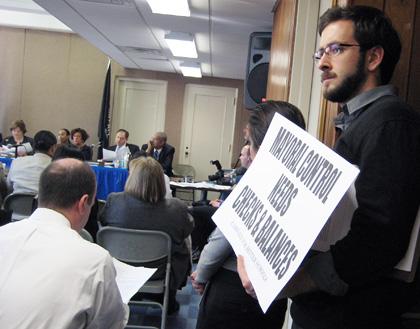By Anna Gustafson
At the state Assembly’s first hearing on mayoral control of city public schools last Thursday, Queens residents and lawmakers both assailed and praised the way city administrators have run the school system since 2002.
Individuals from Queens, ranging from a pastor to presidents of community district education councils, voiced a wide variety of opinions on mayoral control, with some saying it had caused graduation rates to skyrocket, while others contended the control had marginalized parents and teachers who no longer felt they had a voice in their schools.
“Most parents are very unhappy, but they do not want to throw out mayoral control,” said Robert Caloras, president of Community District Education Council 26, which covers 31 schools in Fresh Meadows, Bayside, Flushing, Queens Village, Floral Park, Little Neck, Bellerose, Glen Oaks and Douglaston.
Hundreds of city residents squeezed into a Borough Hall room in Kew Gardens for the first of five hearings lawmakers will hold on mayoral control. Legislators will vote this spring to extend, change or eliminate the 2002 law that gave the city’s mayor control of the school system. The 2002 law is set to expire in June.
For 40 years prior to 2002, schools had been governed by a central Board of Education appointed by the mayor and borough presidents and 32 elected community school boards. Both the Board of Education and school boards were mandated by state law. The mayor was then still in control of the schools’ budgets, but the Board of Education ran school policy.
The hearing lasted for nearly seven hours and was hosted by state Assemblywoman Catherine Nolan (D−Ridgewood). Other Assembly members there included Andrew Hevesi (D−Forest Hills), Mark Weprin (D−Little Neck) and Rory Lancman (D−Fresh Meadows).
Borough President Helen Marshall, city Public Advocate Betsy Gotbaum, Deputy Mayor for Education Dennis Walcott and Chief Family Engagement Officer for the DOE Martine Guerrier were also present.
“Our graduation rate is now at 55.8 percent, our highest in decades,” Walcott said. “The graduation rate in Queens has improved by 23 percent since 2002.”
While Hevesi remained quiet throughout the hearing, Weprin and Lancman both criticized the current educational system, saying it has diminished the power parents and superintendents once had in their districts and has relegated too much control to a central bureaucracy.
“I don’t believe we would’ve passed the law if we had known this haphazard bureaucracy would be created,” Weprin said, referring to what he contends is the chancellor’s creation of a government agency that consolidates the power at the top.
Lancman also said he was disappointed with the way the 2002 law had played out and said city Schools Chancellor Joel Klein should hand over more power to School Leadership Teams, a group made up of parents and school staff, in being able to hire and fire principals.
Other hearing participants were not so critical of the control, and Calvin Rice, pastor of New Jerusalem Baptist Church in Springfield Gardens, said the move has proved positive.
“With the mayor in charge, records show schools are safer, teachers are better paid and graduation rates are way up,” Rice said.
A Quinnipiac University poll released last Wednesday found 56 percent of city residents think mayoral control should continue. The poll also found 34 percent of New Yorkers want to see Bloomberg’s control of city schools end in June.
Reach reporter Anna Gustafson by e−mail at agustafson@timesledger.com or by phone at 718−229−0300, Ext. 174.



































